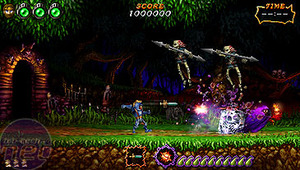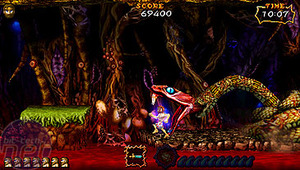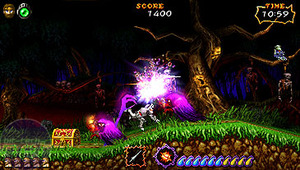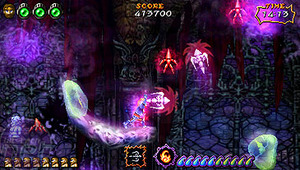Goblin hunting
So why did I keep on playing? Partly it was because I didn’t want to write an article for bit-tech having only completed the first two levels. But it certainly wasn’t because of any involvement with narrative or plot, or any sense of satisfaction from solving puzzles, and nor did I give a toss, really, about any of the characters.Initially, I didn’t think I had any emotional involvement with the title, either, until I realised that actually, Ultimate GnG’s difficulty enables it to harness one emotion extremely well: it’s probably best called exasperation.
I realise this doesn’t sound good (you can’t imagine it listed on the back of the box, can you?), but exasperation is a key part of the audience’s emotional response to many thrilling scenarios. Exasperation is present – and crucial - in everything from horror movies to romantic novels.
Think about the horror movie’s lonely heroine wandering through the dark house where you know the killer lurks; the thriller’s hero rushing into what you’ve seen is a set-up, the man and the woman in a novel who can’t voice the true feelings each has voiced to you on previous pages.


What makes the moments of suspense so unbearable and yet so sweet for us as an audience is that we know – or we think we know what’s going to happen – and all we can do is a watch, and we go through a crunch of finger-clenching, aaaarrghghg, look-behind-you-turn-on-the-lights-just-do-something exasperation. For films, TV and books, creating this kind of atmosphere is made easier by the fact that as an audience, we’re viewers not participants. The hard glass of the screen and the unmoving, already printed words on the page mean shouting ‘HE’S BEHIND YOU WITH AN AXE!’ won’t work.
This is obviously not true with videogames; we are in control. The only thing distancing us from the action is difficulty. Properly used then, difficulty is the method which stops us from having a direct, saving influence; it dilutes our ability to make the fictional world safe and right. It’s the way that holds us back and back, and builds up the exasperation and tension builds.


The flaws in Ultimate GnG – and there are some, like the fact you can’t shoot diagonally, can’t control Arthur in mid-jump – only add to this sense of distance. What makes this strategy pay off in Ultimate GnG is that you don’t keep failing. You do eventually succeed. You make the jump, you progress to the next level. The fact that this progress is clutched from such maddening exasperation is what makes it worthwhile.
There will be players who are put off the toughness of titles like Ultimate GnG, and certainly one of the reasons that games are experimenting with different difficulties, or getting easier (depending on your point of view) is the desire from games makers to broaden the market and appeal to new players. The danger is that by trying to be too accommodating, games that are too easy or too flexible lose what makes them precious to the player: the sense that getting through them – experiencing them, surviving them – actually matters.

MSI MPG Velox 100R Chassis Review
October 14 2021 | 15:04










Want to comment? Please log in.